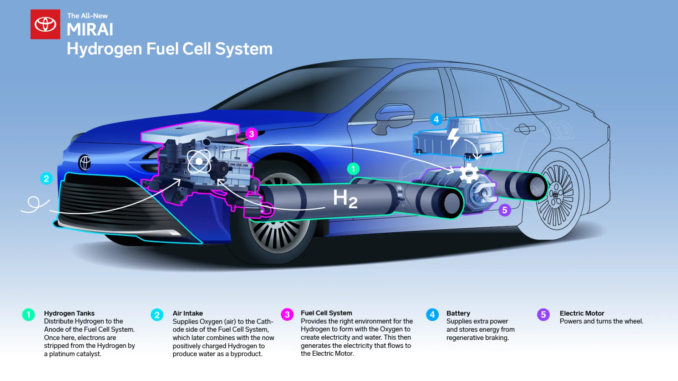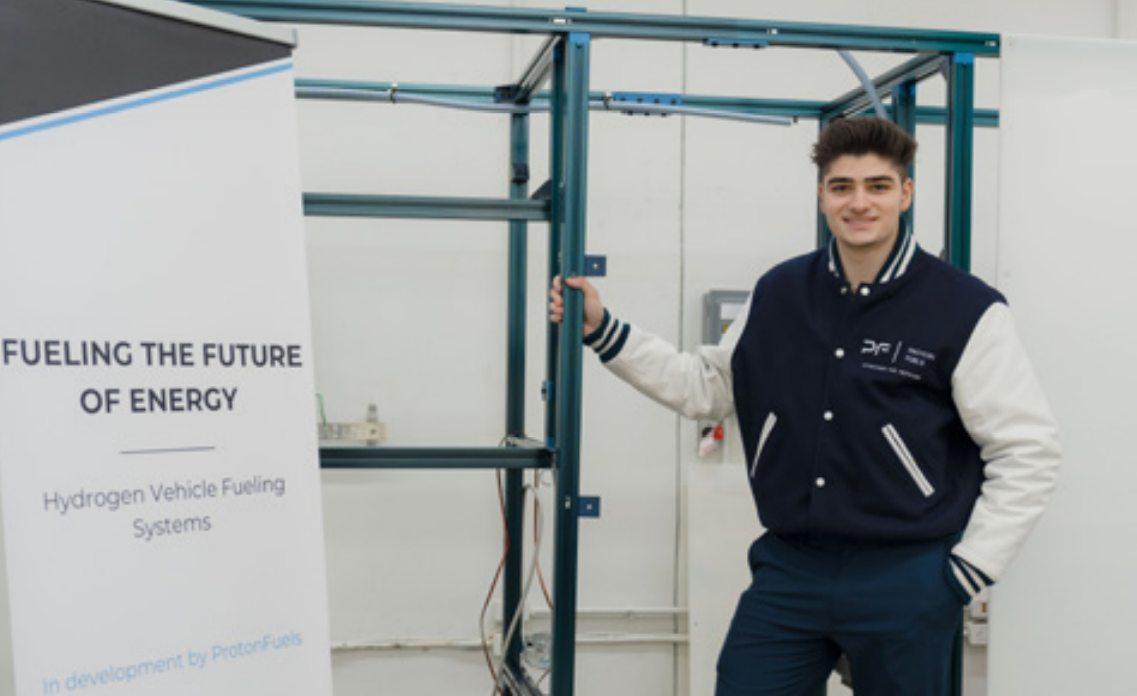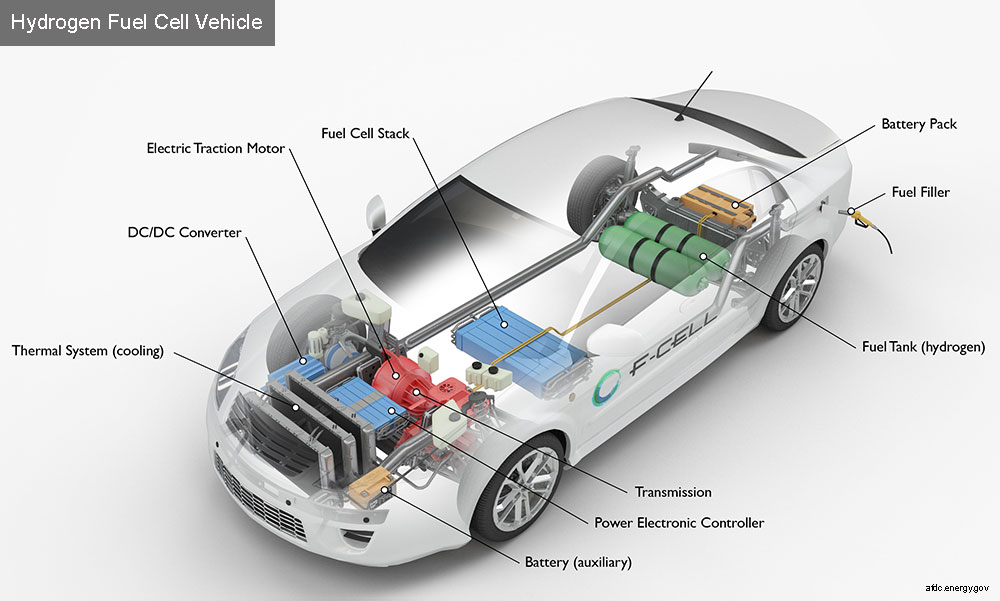
Building a new technology
On October 9th, 1903, the New York Times published Flying machines which do not Fly, an editorial which argued that man would not achieve flight for another “one to ten million years.” Just two and a half months later, on December 17th 1903, the Wright Brothers flew their first successful test flight. In only 11 years, from 1958 to 1969, the United States went from struggling to launch a hunk of junk into orbit to landing two men on the moon and returning them to Earth alive. Twenty years ago, the only people to think twice about electric vehicles were risky investors and green vehicle enthusiasts. Today Tesla is a household name, and car manufacturers around the world have made EV’s a major part of their fleets.
Majd Bayouq wants to build a network of hydrogen fuel cells. Like rocketry, flight, and lithium car batteries, hydrogen fuel’s potential applications are too numerous to count. But Bayouq’s hydrogen fuel cell company, Proton Fuels, faces many of the same challenges that these technologies once faced.

New technologies face a difficult contradiction: they need to be built, tested, and used in order to get better; but building and testing costs money, and most people don’t want to use a technology until it’s already reached the point where it’s better. For companies like Tesla, the solution was to persuade the US government to offer massive grants, subsidies, and contracts to the tune of billions of dollars in order to build the technology into something the average consumer could use.
Bayouq is taking a different route. He’s identified heavy industry as the obvious choice for growing his nascent of hydrogen fuel cell. “The real need for this is in heavy duty trucking applications. So, a big problem with, for example, semi-trucks being battery electric is that batteries are so heavy, that the energy density is very low, so that you end up where like half of your legal weight is just the battery,” he says.
Though electric vehicles are advertised as green, the resources needed to produce them have caused their share of ecological harm. But hydrogen fuel cells don’t face this limitation: “They’re much more sustainable than the rare earth metals that you have to extract to build, you know, lithium battery packs,” Bayouq adds.
John G. Smith is the Vice President of content and design at Newcom Media. He produces news in the world of long-haul trucking. He’s followed the development of hydrogen fuel technology in trucking for years. “Most of the fleets I’ve talked to, they’re still on the testing phase there. They’re trying it out. They’re seeing how it would fit within their operations, and a lot of that is dictated by the fuel itself. There is some interest in the Calgary Edmonton corridor, for example, in different areas where again, the infrastructure for the fuel already exists.”

Smith says trucking companies are curious about the technology, but not yet willing to widely embrace it. He says trucking companies still have many questions: “How is the fuelling process different? What’s the maintenance like? And more than anything else, how does it perform in different weather conditions and different ranges? Can it fit within their operations?”
Proton Fuels finds itself in a position where it wants to develop the technology but needs future users who are willing to partner on building the infrastructure out. “We have to essentially take on more of a consultant role where we get all of these different stakeholders together in an environment where we can actually build a product,” Bayouq says. “We’re trying to get all of these different people, whether it be industrial partners, manufacturers, different people who might want to actually have a hydrogen fuelling station at their office, or at their building or whatever, and getting all these people together to build out technology.”
It's unlikely that it will take one to ten million years to get Bayouq’s hydrogen fuel cell off the ground. Bayouq believes he simply needs to prove the concept, just as lithium electric vehicles had to show their proof of concept. “They weren’t necessarily advertising the idea of electric vehicles. They were advertising that they work now, that they’re efficient, that the cars are comfortable to drive now, and so what we’re looking to do is to solve the reasons why you can’t have a hydrogen car.”
A Hydrogen Fuel Cell FAQ:
What is a hydrogen fuel cell?
As their name suggests, these fuel cells use hydrogen gas to create a reaction with oxygen, combining to create electricity. The only emissions in the process are water vapour and hot air – both free of pollution.
How are they fueled?
There are many ways to create hydrogen gas, and not all of them are green. However, the conversation around hydrogen fuel cells is centered in the movement for green technologies – and there are ways to make green hydrogen. The foremost way is through electrolysis: a process where water is split into its component hydrogen and oxygen atoms. The only requirement for electrolysis is electricity. Much like with lithium batteries, the greener the electricity, the greener the outcomes.
As Proton Fuels’ Majd Bayouq explains, “in Ontario, our electricity grid is relatively clean. So most hydrogen that’s made through electrolysis is green hydrogen… And that allows you to have a process where from production to consumption in the vehicle, the entire process is no emissions at all.”
Will my hydrogen car explode in a giant ball of fire like the Hindenburg?
No, hydrogen fuel cells are not at risk of exploding like the Hindenburg. In reality gasoline – which of course is highly flammable and deeply toxic – is actually more dangerous than hydrogen. Lithium batteries are not without their risks either. Overall, hydrogen fuel cells are quite safe and reliable, and will only continue to get safer as the technology is proliferated.

Why Hydrogen Fuel?
As Bayouq has alluded, the long-term risk of lithium mining for battery-electric vehicles like Teslas is ecocide. Because hydrogen fuel cells produce electricity for the vehicle, the batteries needed for hydrogen vehicles are far simpler than those requiring lithium. Lithium batteries are also extremely heavy, making them totally impractical for larger applications like airplanes and freight ships.

Hydrogen vehicles can refuel far more quickly than their battery-electric counterparts. While it takes a Tesla approximately 25-45 minutes to fully supercharge depending on the model, a comparable hydrogen car can fully refuel its hydrogen gas tank in 3-5 minutes. Of course, hydrogen charging infrastructure will have to be built out in order for this advantage to be wholly realized by consumers.
How HELIX helped Proton Fuels:
HELIX is a small business incubator organized by Seneca Polytechnic that provides aspiring entrepreneurs with tools and resources for getting their ideas off the ground. HELIX offers microgrants and other forms of funding to businesses who desire it, but they also offer spaces for new entrepreneurs to be coached and guided through the first steps of starting their business.
Majd Bayouq began his journey at Proton Fuels through the HELIX Summer Institute, where participants enter group coaching sessions with experienced advisors. “At that point, the company was really just an idea that I had, you know, based on a space that I found to be very high potential and underutilized. And so, I joined the Summer Institute, and got experience in entrepreneurship projects, working as a team, working with other entrepreneurs. And since then, through their HELIX business coaching is when I really started to try to make some progress on the business,” Bayouq says. The business coaching he experienced allowed him to see how other startups, sometimes in totally different fields, approached similar challenges.

Be the first to comment